Matt Moore's Blog, page 12
August 12, 2013
Review of my short story “Delta Pi”
Derek Newman-Stille has posted a review of my short story “Delta Pi” on his Speculating Canada blog: Malicious Math.


July 6, 2013
Branding Yourself as an Author through Clothing
Imagine you’re at a science fiction convention and Neil Gaiman walks in the room. Quick: What’s he wearing?

Neil Gaiman’s consistent wardrobe helps brand him as a writer.
Black jeans, black t-shirt, black leather jacket.
How do you know this? Because that’s what he always wears. It’s part of his personal brand.
If you’re an up and coming writer, you need to think about your our brand and how your clothing is a part of that. What you wear will say a lot about you. Plus, it will help you get recognized.
What is a brand?
Often, we think of “brands” and “logos” interchangeably. But the best way to think about a brand is your reputation doing fieldwork. (And I am certain someone coined that phrase, but a 20-minute Internet search yielded nothing. If you know who said it, leave a comment.) It’s how you feel about something.

What kind of reaction do these logos provoke? If you have any reaction, it means these brands are working.
For example: Dunkin’ Donuts (or Tim Horton’s for you Canucks) and Starbucks. Both are coffee places. But some of you just rolled your eyes at Dunkin’ Donuts’ coffee and can’t live without your morning grande skinny mocha. Others are rolling your eyes at “grande skinny mocha” and want an honest-to-goodness cup of joe from Dunkin’s. Others are Booster Juice addicts and couldn’t care less about coffee.
Regardless of your camp, I hope you get the point. Brand is how you feel and perceive a product.
In the world of writing, let’s mention names like Stephen King, Stephanie Meyer or E.L. James. Your reactions to these names are not based on them as people, but as writers. That is, the brand names they have become.
So why brand yourself as a writer?
Writing should be a meritocracy where the best writers sell the most books and have the most fans.
This is not the case. It’s human nature to identify with and support those we like. This is why writers go to signings and conventions. They can grow and strengthen their fanbase through interaction. They understand that if someone likes the writer, they’ll buy the writer’s book(s).
But to be more precise: If readers likes who they perceive the writer to be, they will buy books.
Another aspect is industry professionals at a convention. Agents, editors and publishers are looking for authors who take the business seriously.
So what kind of impression do you want to make?
This is where your personal brand comes in. It is not about misleading someone or creating a false identity. But what sides of yourself will come through? After all, if you don’t have a marketing machine like King or Meyer, you need to do this work yourself.
Since someone will see you before they talk to you, clothing is the first step.
How to build a brand through clothing
First, your style of clothing should reinforce who you are and how you want to be seen: relaxed, professional, brooding, spirited. Do you want to dress all in black since you write vampire fiction? Leather and bright colours to reflect your epic fantasy novels? Or maybe a blazer over a collared shirt to show you’re a professional regardless of genre.
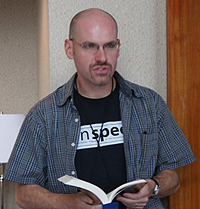
Here’s me in my standard con-wear. Casual, approachable and just a little nerdy.
For me, you’ll find me in blue jeans and a collared short sleeve shirt over a t-shirt with something clever on it. As a writer of dark, brooding science fiction and horror I want people to know that, as a person, I’m relaxed and approachable. Plus, it’s versatile enough to allow combinations and I can wear it outside the convention hotel.
What’s more, dressing in a consistent manner will help you be found. If someone you think is Neil Gaiman is walking around in a tie-dye t-shirt, khaki cargo shorts and flip flops, it’s not Neil Gaiman. (Or maybe he’s going incognito.) If you’re consistent, you will be found more often. Considering how many people attend a convention, being able to be spotted across the room and people being certain it’s you is essential.
Don’t go too far
But you can risk going overboard with your own personal style. I’ll talk about this in detail at later this summer, but going too far—be it goth clothing with pancake make-up and black lipstick; to steampunk or high fantasy cosplay—can send mixed messages.
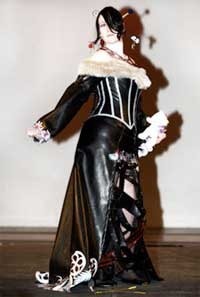
Great costume, but does it make you think she’s a writer or cosplayer? You can be both, but when you are in author-mode, don’t give people mixed messages.
Clothing that is too dark and brooding might make you look unapproachable. Or, if you dress too casually you might appear like an amateur to someone in the industry. Since cosplay is a fandom domain, you could be mistaken for a fan and not a creator. There’s nothing wrong with cosplay if you are going to a costume ball or competing, but if you wear it all the time people might wonder if your “costume” is there to compensate for weak writing.
(For example, I once spent an uncomfortable elevator ride with a science fiction “author” dressed in elaborate military SF outfit. Turns out he had spend months designing and building the costume, which was a character from his novel. I asked who his publisher was, but it turns out he hadn’t even started writing it yet. I admit his costume was very good and give him full marks, but had I been a publisher or agent I would not have spent another moment on him.)
Now go find your personal look
How you dress as an author doesn’t have to be how you dress in real life. But it should reflect some part of you. It is not a costume to hide in, but a way to help others approach and engage you. You should feel comfortable and confident in it. If you are part of a niche genre, include some signal others in that genre will recognize and respond to.
Build yourself as a brand and get recognized.


July 5, 2013
I’m over on the Page of Reviews today

Remember when Rick used to be horrified when he used his gun? And because he was, so were we. That’s missing now in The Walking Dead.
Page of Reviews mastermind Adam Shaftoe had been laid low, so he asking me to contribute something.
My piece “Why it’s Hard to Make Horror for TV (or “Why I stopped watching The Walking Dead”)” discusses the topic of horror and what makes something horrifying versus thrilling. I talk about how our tastes in horror have evolved, mostly in response to what we are able to deal with as a society.
And as a jaded society that can get real-time footage from a war zone, what’s left to horrify us? Rather than the extremes, it’s small changes to our assumptions about our everyday life.
Stop on my and give it a read!


June 22, 2013
Remembering George Carlin
It’s been five years since George Carlin passed away. I wanted to mark his passing.
George’s anti-conformist, question-everything views meshed well with my teen-aged attitudes and Yankee-liberal beliefs. He influenced my politics more than any other individual. His perfect control of pitch and tempo, specific use of profanity, and pointed observations of the everyday-absurd shaped my sense of humour, including my Wisdom for the Day blog.
I used to watch videotapes of his HBO specials with my friend Pete up his room, door closed again his parents hearing us. We’d watch them endlessly, having to pause and rewind because we were laughing so hard. Expressions like “some people are fucking stupid” and “The planet isn’t going anywhere. We are!” and “You don’t take a shit. You leave a shit.” wormed their way into our vernacular.
And when I found so many of these specials on Netflix, I almost put my marriage at risk listening to them constantly.
So to honour George, here’s “The Modern Man”, which sums up what I love about him. All the useless jargon rammed into one soliloquy that reads like poetry. On its own, each terms acts like fertilizer—a little bit to help facilitate the process of salesmanship.
But taken together, George has exposed them for what they are: a big pile of shit. Thanks, George.
The Modern Man by George Carlin
I’m a modern man, a man for the millennium, digital and smoke-free.
A diversified multi-cultural post-modern deconstructionist, politcally, anatomically, and ecologically incorrect.
I’ve been uplinked and downloaded.
I’ve been inputed and outsourced.
I know the upside of downsizing.
I know the downside of upgrading.
I’m a high-tech lowlife, a state-of-the-art bi-coastal multitasker, and I can give you a gigabyte in a nanosecond.
I’m new wave, but I’m old school, and my inner child is outward bound.
I’m a hot-wired, heat-seeking, warm-hearted cool customer.
Voice-activated and biodegradeble.
I interface with my database, and my database is in cyberspace, so I’m interactive, I’m hyperactive, and from time to time, I’m radioactive.
Behind the 8-ball, ahead of the curve, riding the wave, dodging the bullet, pushing the envelope.
I’m on point, on task, on message, and off drugs.
I got no need for coke and speed.
I have no urge to binge and purge.
I’m in the moment, on the edge, over the top, but under the radar.
A high-concept, low-profile, medium-range ballistics missionary.
A street-wise smart bomb.
A top-gun bottom-feeder.
I wear power ties, I tell power lies, I take power naps, I run victory laps.
I’m a totally ongoing, bigfoot, slamdunk ,rainmaker with a proactive outreach.
A raging workaholic, a working rageaholic, out of rehab and in denial.
I got a personal trainer, a personal shopper, a personal assistant, and a personal agenda.
You can’t shut me up, you can’t dumb me down, ’cause I’m tireless, and I’m wireless.
I’m an alpha male on beta blockers.
I’m a non-believer and an overachiever.
Laid back, but fashion forward.
Pp front, down home, low rent, high maintenance.
Super size, long lasting, high definition, fast acting, oven ready, and built to last.
I’m a hands-on, footloose, kneejerk headcase, prematurly post-traumatic, and I have a love child who sends me hate mail.
But I’m feeling, I’m caring.
I’m healing, I’m sharing.
A supportive, bonding, nurturing, primary caregiver.
My output is down, but my income is up.
I take a short position on a long bond, and my revenue stream has its own cash flow.
I read junk mail, I eat junk food, I buy junk bonds, I watch trash sports.
I’m gender specific, capital intensive, user friendly, and lactose intolerant.
I like rough sex.
I like tough love.
I use the F-word in my e-mails, and the software on my hard drive is hardcore, no soft porn.
I bought a microwave at a minimall.
I bought a minivan at a megastore.
I eat fast food in the slow lane.
I’m tollfree, bite size, ready to wear, and I come in all sizes.
A fully equipped, factory authorized, hospital tested, clinically proven, scientifically formulated medical miracle.
I’ve been prewashed, precooked, preheated, prescreened, preapproved, prepackaged, postdated, freeze dried, double wrapped, vacuum packed, and I have an unlimited broadband capacity.
I’m a rude dude, but I’m the real deal.
Lean and mean, cocked, locked, and ready to rock.
Rough, tough, and hard to bluff.
I take it slow, I go with the flow, I ride with the tide, I got glide in my stride.
Drivin’ and movin’, sailin’ and spinin’, jivin’ and groovin’, wailin’ and winnin’.
I don’t snooze, so I don’t lose.
I keep the pedal to the metal and the rubber on the road.
I party hardy, and lunch time is crunch time.
I’m hangin’ in, there ain’t no doubt, and I’m hangin’ tough, over and out.


June 6, 2013
Schedule for World Horror Convention 2013
Next week, I’ll be at the World Horror Convention in New Orleans!
I’m excited to tell you I’ll be on a panel and attending the mass signing on Friday night. My schedule is:
Mass Signing
Friday, June 14
8PM-9PM
Royal Room
Lovecraft’s Eternal Fascination
Saturday, June 15
2PM-3PM
Royal Room
At the signing, I’ll have free copies of my Aurora-nominated short story “Delta Pi”. If I sign it and you bring it to the Post Mortem Press table, they’ll give you a $3 discount on Torn Realities or Fear the Abyss, two anthologies I have stories in.
Will I see you there? (Or did I see you there?) If so, leave me a comment.


June 2, 2013
Dan Harmon’s Return to Community a Victory for Fandom and Storytelling
The return of Dan Harmon as showrunner of Community was announced via Twitter yesterday morning:
RT @dpeanutbutter: @danharmon GIVE US A STRAIGHT ANSWER! ~ Yes yes yes! I'm back I'm back I'm back. You can thank @joelmchale.—
Dan Harmon (@danharmon) June 01, 2013
If you’ve read this blog, you know I’m a fan of Community. My “What is the Meaning of #SixSeasonsAndAMovie?” post has had over 40,000 views since I posted it in May, 2012 when the third season finale aired. From the comments, I know it’s touched a lot of people.
So like most Community fans, I was shocked when Harmon was fired as showrunner at the end of the third season.
And the fourth season felt, to paraphrase someone on Twitter, like bad fanfic.
So I am thrilled. Not only does it mean Season 5 will return of Harmon’s vision of Community. It is a victory for storytelling and storytellers.
Good television needs a strong, central vision
Not just its creator, Harmon had a hand in every episode of the series. Sometimes considered controlling or stubborn, Harmon has a vision. In a storytelling format where many people—actors, writers, directors, producers—shape an episode, having one person with a singular vision is necessary for a show to stand-out.
Consider MASH, The Walking Dead, The X-Files, Battlestar Galactica and Buffy the Vampire Slayer. These are stand-out shows that have and will stand the test of time. The reason is their creators—Larry Gelbart, Frank Darabont, Ronald D. Moore and Joss Whedon—didn’t just want to create a series of episodes. [NOTE: I realize these are all men. Please leave a comment to let me know the women of television whose vision has shaped great series.] They knew the stories they wanted to tell. Create shows different than what had come before. When Gelbart and Darabont left their series and Carter and Whedon created more shows, their original efforts suffered.
Victory for fans
But more than a victory for the power of a storyteller, this is a victory for fans. The outcry from Community fans on social media about Season 4 was deafening. The quirky, meta and clever humour had been replaced by Chuck Lorre-inspired comedy aimed at the centre of the bell curve. I admit, Community is not for everyone. But as the old saying goes in storytelling (and marketing), if you try to appeal to everyone, you’ll end up appealing to no one.
So even though I have no doubt NBC’s decision was a commercial one (and I don’t hold a grudge there, they are a business), I also have no doubt it was the pressure of fans that forced this decision. Hey, if it worked for Jericho, it could work for Community.
And not just old-school fans, but those who found seasons 1-3 of Community in syndication, fell in love with it, and wondered why the hell season 4 was so different.
Thanks for coming back, Dan
Let’s also not forget the Harmon could have told NBC go to suck an egg. His dismissal from the show was less than professional on NBC’s part. So his return has this third angle.
So here’s hoping that Season 5 kicks-off with a similar opening as Season 3 (below). As friend and pin-point-precise critic Adam Shaftoe observed, this was Harmon’s middle-finger to NBC execs who no doubt had passed him notes that Community was getting too out there.
And to NBC, leave Harmon alone. Let him make his work. He is gaining fans. This is about ratings, right? Let’s watch them grow.


May 26, 2013
Op-Ed Piece in Latest On Spec
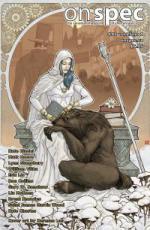
Cover for the latest issue of On Spec (Spring 2013)
I’m thrilled to announce I have an op ed piece in the latest issue (Spring 2013) of On Spec magazine.
“Next Stop: Suburban Fantasy” talks about why Urban Fantasy has become such a dominant genre. Is this combination of gritty urban setting, kick-ass heroines, romance/sexuality, and fantastic creatures a parallel of our modern, urban lives?
More than that, could the societal forces that made Urban Fantasy so popular shift the focus of speculative fiction into the suburbs in the next few decades? (From the title, it’s obvious I think the answer is “yes”.)
Here are the opening paragraphs:
It’s human nature to fear what we don’t understand. To reduce our fear, we strive to explain or rationalize it. These explanations often fit into some contemporary context so we can relate to them. At the same time, we may project something greater than ourselves onto these fears to justify our lack of comprehension.
It’s is not surprising, then, that Urban Fantasy is such a popular genre as it’s a way for us to come to understand our urban lives. More and more we are becoming an urban population and cities present new unknowns. The concentration of people, the constant movement, and the density in all three dimensions is something that inspires feelings ranging from awe to dread. While we might be able to comprehend the goings-on in a town of 2,000, we can’t hope to understand more than a fraction of what’s happening in a city of 100,000. To say nothing of a Toronto or a Montreal. So Urban Fantasy as a genre has become the way we try to make sense of our urban lives—by projecting the fantastic onto our cities.
This is my second column with On Spec. In Fall 2011, Adam Shaftoe and I wrote “All This Has Happened Before: Cycles in Genre Fiction”. Also, I made my first fiction sale to On Spec. My nanite lycanthrope SF/horror story “Full Moon Hill” ran in their Fall 2007/2008 issue.


May 18, 2013
Please Vote for “Delta Pi” in the 2013 Aurora Awards
You can now vote for the 2013 Aurora Awards. My short story “Delta Pi” from Torn Realities is nominated in the “Best Short Fiction – English” category.
It only takes a few minutes to vote. You can learn more by visiting Please Vote for Δπ (Delta Pi). You can read the entire story online or download it as an ebook in PDF, MOBI and EPUB formats.
The Auroras recognize the best in Canadian science fiction, fantasy and horror. Any Canadian citizen or resident can vote. Past nominees including some of the leading names in Canadian science fiction and fantasy like Robert J. Sawyer, William Gibson and Peter Watts.
Thanks for your support!


May 17, 2013
Aurora Recommendations
As you may have heard, my story “Delta Pi” has been nominated for the 2013 Prix Aurora Awards in the best short fiction category. I have posted information on how you can vote for it. But there are so other nominees I hope you will support.
Below are my recommendations for the 2013 Aurora Awards.
NOTE: If I list nominees with numbers, those are the order I recommend you vote in. If it’s bullet points, I have no recommended order. The order of the bullets is by last name; vote as you wish.
The awards will be presented at Can•Con: The Conference on Canadian Content in Speculative Arts and Literature taking place in Ottawa on October 4-6. As such, I am giving the edge to Ottawans.
To vote in the Auroras, you must be a member of the Canadian Science Fiction and Fantasy Association. You can learn how to become a member on their site.
Best Novel
I’m friends with both Marie and Chadwick. While Chadwick is organizing the ChiSeries in Winnipeg, Marie gets the edge for living in Ottawa.
Destiny’s Fall by Marie Bilodeau, Dragon Moon Press
Thunder Road by Chadwick Ginther, Ravenstone Books
Best Short Fiction
Of course I want you to vote for me! But give my friend Marie Bilodeau a vote too. Also, my friends Suzanne Church and Douglas Smith are also nominated, but they have both won the Aurora already… and they don’t live in Ottawa.
“Delta Pi” by Matt Moore, Torn Realities, Post Mortem Press
“Happily Ever After” by Marie Bilodeau, When the Villain Comes Home, Dragon Moon Press
Best Poem/Song
I am friends with both Sandra and Helen. I can’t pick between them.
“Roc” by Sandra Kasturi, Come Late to the Love of Birds, Tightrope Books
“The Ghosts of Birds” by Helen Marshall, Phantom Drift 2: Valuable Estrangements, Wordcraft of Oregon
Best Related Work
This one gives me fits. I am giving Hayden the #1 slot since he’s from Ottawa. But Imaginarium is a great anthology, Hair Side, Flesh Side is a marvelous collection and On Spec is a great magazine (and they bought the first story I ever sold).
Blood and Water edited by Hayden Trenholm, Bundoran Press
Imaginarium 2012: The Best Canadian Speculative Writing edited by Sandra Kasturi and Halli Villegas, ChiZine Publications / Tightrope Books
Hair Side, Flesh Side by Helen Marshall, ChiZine Publications
On Spec published by the Copper Pig Writers’ Society
Best Artist
No contest. Erik Mohr’s covers for ChiZine Publications is the bomb.
Erik Mohr, cover art for ChiZine Publications
Best Fan Filk
Again, no contest. Plus, Mari has been the musical guest at ChiSeries Toronto for some time now.
Kari Maaren, Body of Work
Best Fan Organizational
Another tough one. The World Fantasy Convention was a masterpiece. But Sandra Kasturi and the Marshalls sisters have been doing great work in Toronto with the ChiSeries and the SpecFic Colloquium. Not sure in which order you should vote, but definitely vote for all of them.
Evelyn Baker, Amy De Ruyte, and Peter Halasz, Executive Committee of WFC Toronto, 2012
Sandra Kasturi, Helen Marshall, and, James Bambury, Co-Chairs, Chiaroscuro Reading Series, Toronto
Sandra Kasturi and Laura Marshall. Co-Chairs, Toronto SpecFic Colloquium: Beyond the Human
Best Fan Related Work
Helen and Peter do great work, but I have to give the #1 slot to Michael Matheson. Now doubt Helen and Peter deserve to be recognized, but it was for an hour presentation. Michael Matheson has been going all year long to maintain his list of Canadian Speculative Fiction, which the Auroras honour. So vote for all three, but give Michael the #1 slot.
Michael Matheson, compilation and maintenance of the Can Spec Fic List
Helen Marshall, “The Book is Dead; Long Live the Book!”: Some Thoughts on the Coming of eBooks, lecture at the 2012 Toronto SpecFic Colloquium
Peter Watts, “Hive Minds, Mind Hives” lecture at Toronto SpecFic Colloquium


May 4, 2013
The Time Machine Revisited (or To Not Become a Morlock, Just Say “Thank You”)

Oh, don’t worry. This sign doesn’t apply to you.
I recently returned from my first vacation in a few years. It taught me a few things:
Children between the ages of 5 to 8 make all the decisions. Parents can make alternate suggestions, but should be prepared to be corrected, admonished or insulted for speaking out of turn.
Waiting in line is for suckers. You should (literally) run up to the front of the line, state some halfhearted apology about being late (while not making eye contact) and then go about monopolizing the agent’s time. It helps to say it will “just take a second” regardless of how long it actually takes.
Children come in three settings: Shouting, shrieking and whining.
Be as loud and profane as possible at all times so everyone can hear what a fuckin’ bitch your mother-in-law is.
You don’t need to look where you’re going. Keep your eyes on your phone, something off to the side, or just walk backwards for 20 paces. If someone runs into you, that’s their problem.
The “This space reserved for guests over 18 year old” sign does not apply to your precious little darlings.
Has decorum become déclassé?
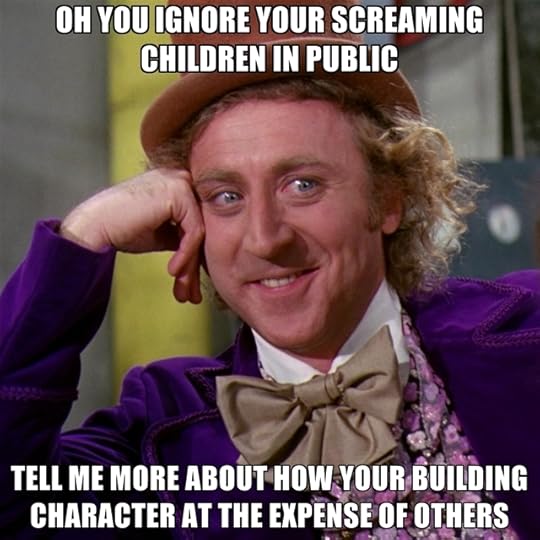
I’m being facetious, but polite behaviour and consideration of others has taken a nosedive since the last time I was out. And as a science fiction and horror writer, I can’t help but think how this observation relates to fiction writing.
Now, a culture where people are so wrapped up with themselves they’re oblivious to others is nothing new. (WALL-E, below, nails this idea on the head.) But I’m not talking about sacrificing real-world relations for those in cyberspace.
And this also isn’t a “damn kids” rant since I saw everyone from children to grandparents acting like this. Nor is this a classist diatribe against hipsters, rednecks, nouveau riche, lefties, white trash or spoiled rich kids. This behaviour ran the gamut—Bud Light swillers and martini drinkers, those with John Deere ballcaps and those with Dolce and Gabbana shades, complaining about “fuckin’ Obama” or “those NRA cocksuckers”.
It’s not about one group. This is about collective civility. It’s like the Internet Fuckwad Theory has migrated into meat space.
Which led me to consider dystopic and utopic fiction.
Utopia and Dystopia: The relation between a society and its systems
Both utopic and dystopic fiction deal with the relationship between a society and its systems. By “systems” I mean technology, government, the environment, the economy, etc. Some of these are human-made, but are beyond the control of any one person or group. “Society” is simply us—how people interact under the influence of these systems.
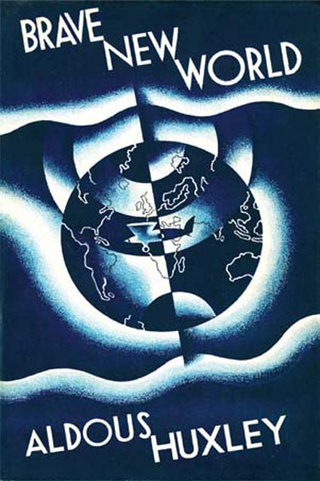
The false utopia of Huxley’s Brave New World was based on Ford’s assembly line concept. To bring it about, systems like commerce and reproduction were changed.
To bring about a utopia, some belief or morality drives a society to reform its systems. For example, eliminating poverty would require massive social change—increased taxation, curtailing the free market and establishing coercive systems to redistribute wealth. Few think poverty is a good thing, but most would not accept these reforms at the expense of their own well-being. Yet what if some new belief system arose? Let’s say a religious or charismatic leader who convinces us to act and reform our economic and social structure, even at the expense of our lifestyle, so that no one has to live in poverty.
In other words, societal change causes systemic change, which leads to utopia. Rarely does some new technology lead to a perfect world. Rather, that new technology causes some societal change and that societal change brings about systemic reforms.
Yet in dystopic fiction, it’s the opposite—systemic failure leads to societal failure, be it economic collapse, climate change or zombie apocalypse. Consider the “Great Panic” in Max Brook’s World War Z where hoarding and mutual suspicion caused more harm than the zombies. Group A has food and Group B has ammunition, but neither group wants to traverse the infected areas to trade. To say nothing of a lack of trust. So either Group A is overrun and Group B starves, or one group has to raid and displace the other.
Or The Handmaid’s Tale where the Sons of Jacob create panic through a staged terrorist attack in order to have the support they need to launch their theocratic revolution.
Societal collapse leads to systems collapse?
Yet rarely do we have fiction where society breaks down before its systems. Simply put, this would mean a people “gives up” and stops working, having children and pursuing leisure (G-23 Paxilon Hydrochlorate notwithstanding). In fiction, we would abhor this. We crave characters who fight against long odds where most people—including the reader—would give up.
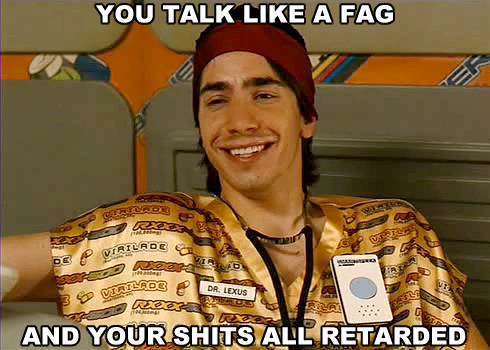
From Idiocracy, but I heard conversations just like this. (What makes this especially amusing is the grammatical error—intentional or not?)
(Aside: A film that explores this concept is Mike Judge’s under-appreciated Idiocracy. Set 500 years in the future, two cryogenically frozen people from the present awake to find the results of the trend where educated, middle class couples delay having children (or don’t have them at all) while dumb people continue to have large families. Over multiple generations, humankind is stupid, ignorant and incapable of maintaining the technology that previous generations build. However, this is not exactly what I am getting at since in this film society has not given up; they are too dumb to even make that decision.)
Yet could we be moving in that direction? Is this rudeness and lack of mutual respect a symptom of a larger issue? Consider that voter turnout continues to drop. Membership in service organizations like the Lions Club or Kiwanis is declining. Interaction with neighbours is limited to a polite wave.
The Time Machine revisited
In H.G. Wells’ The Time Machine, evolution had split humans into two species over hundreds of thousands of years. The working class became monstrous Morlocks, who maintained ancient subterranean technology. The wealthy aristocracy became the frail Eloi, who don’t require strength or intellect since technology has solved their problems.
This division reflected Wells’ sociopolitical views. But through the lens of today, might it be sooner than the 8028th century before we have these divisions?
Societal norms, which enforce behaviour better than laws (e.g., we feel more compelled to not pick our nose in public than obey the speed limit) are breaking down. We are disengaging from our larger society. Yes, there have been systemic problems—economic uncertainty, allegations of election fraud in virtually every election, climate change. But I’d argue people simply don’t care anymore. There’s no consequence for being rude or uncivil, so why bother? Especially when selfish behaviour results in positive outcomes for you? So it’s not that our systems our failing, by disengaging from society we will come to ignore our systems, leading to their failure.
Rather than Morlocks and Eloi, in several thousands years might humanity evolve into two species different than what Wells envisioned? One might be loud, rude, oblivious brutes incapable of cooperation. But another would be the descendants of those who held to societal conventions. Might this latter group, through cooperation, manipulate systems to their advantage and use the former group as cheap labour? It won’t be The Matrix that enslaves us, but those few among us still saying “Please” and “Thank you”.
It could make for some very interesting science fiction.





